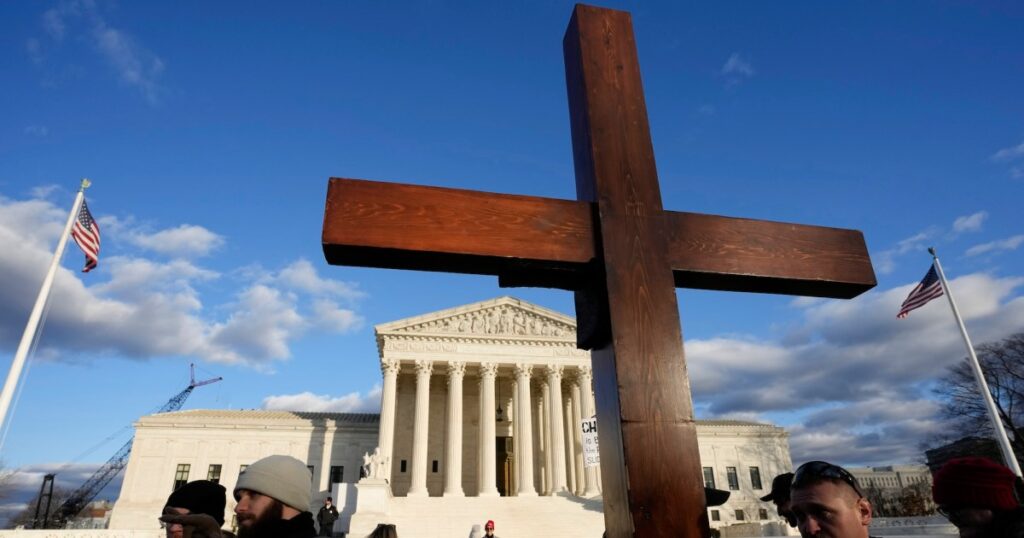A person holds a cross outside of the Supreme Court during the 2023 March for Life.Alex Brandon/AP
The Supreme Court agreed last week to hear a case that could pave the way for states to kick Planned Parenthood clinics and affiliated doctors out of their Medicaid programs. The case threatens the ability of the nation’s largest family planning organization to provide their low-income patients with birth control, cancer screenings, and STI testing and treatment—services that have nothing to do with abortion.
Back in June, the Alliance Defending Freedom (ADF), the religious-right legal group behind the fall of Roe v. Wade, legal attacks on the abortion pill, and some of the most important anti-LGBTQ laws and Supreme Court cases of recent memory, filed the request that the nine justices hear this case.
They asked on behalf of their client, the South Carolina health department. That is part of a pattern: ADF has increasingly represented state governments in efforts to defend abortion bans and anti-trans laws. My colleague Pema Levy reported earlier this year that this work has raised ethical questions about how a religious organization that brings in over $100 million annually from mostly undisclosed donors can represent the public in court while also advancing a religious agenda.
The case, known as Kerr v. Planned Parenthood South Atlantic, dates back to the summer of 2018, when South Carolina Republican Gov. Henry McMaster ordered his state’s health department to declare any doctors or clinics who provided abortion “unqualified” to offer other family planning services. McMaster’s order didn’t have anything to do with the doctors’ resumes or the quality of their healthcare. Instead it was calculated to punish Planned Parenthood financially by making it ineligible to receive Medicaid reimbursements for the non-abortion services that, contrary to popular misconception, make up the vast majority of its work. Medicaid, which provides health coverage for people who are low-income, already does not cover abortion—a prohibition that has been federal law for decades. But “the payment of taxpayer funds to abortion clinics, for any purpose, results in the subsidy of abortion and the denial of the right to life,” McMaster reasoned in his executive order.
Politically, the executive order was a way for McMaster to “take an anti-abortion stand,” per the resulting headlines. But practically, it hurt South Carolinian women on Medicaid who relied on their local Planned Parenthood clinic for everyday reproductive healthcare.
South Carolina wasn’t the only state to attack Planned Parenthood in this way. Arizona, Arkansas, Indiana, Kansas, and Texas all tried to impose similar restrictions, according to Jane Perkins, litigation director for the National Health Law Program. Texas was one of the few to succeed, and as I wrote in October, the attacks on Planned Parenthood there forced many reproductive health clinics to close, cut hours, charge patients new fees, or ration IUDs and birth control implants. Ultimately, they could only serve half as many patients. The teen birth rate rose an estimated 3.4 percent.
In response to the restrictions, Planned Parenthood patients and state affiliates have filed a series of lawsuits, arguing that they violate a federal Medicaid provision dating back to 1967 that guarantees patients the “free choice” to see any “qualified” provider who agrees to take Medicaid. The whole point of that provision was to stop states from restricting patient options, which Congress worried would be a step toward socialized medicine.
Federal appeals courts have mostly agreed with this argument. At least four of them have decided that states that exclude Planned Parenthood from Medicaid are violating the “free choice” provision, and that abortion clinics and their affiliates “are qualified providers, and what the state’s doing here is essentially a policy or politically motivated activity to ban Planned Parenthood,” Perkins says. But a couple of courts, including the far-right Fifth Circuit, have thrown out the lawsuits on technical grounds, ruling that states have the power to decide if providers are “qualified,” and that individuals can’t sue over their decisions.
That’s the question the Supreme Court has now agreed to review in Kerr. If the court sides with South Carolina, “it would certainly pull the door open” for more states to kick Planned Parenthood out of their Medicaid programs, Perkins says. Such a ruling could have consequences beyond reproductive healthcare—giving states greater power to pick and choose which doctors can see Medicaid patients.
It would also be in line with the conservative justices’ recent tendency to declare that courts should defer to state decision-making on whether to restrict healthcare for women or trans people. That’s essentially what happened in Dobbs v. Jackson Women’s Health Organization, which allowed states to ban abortion. The same outcome appears likely in a current case, United States v. Skrmetti, where the justices seem poised to green-light state bans on puberty blockers and hormone therapy for trans minors.
Perkins is worried about Kerr. “I sort of went through a hair-stand-on-end,” she says. Just two years ago, the Supreme Court took a case on a similar question, and reaffirmed the framework courts use to decide when individuals can sue over Medicaid provisions. That case is similar to this one, though it involved nursing homes rather than abortion providers. “To come along not two years later and take a case on…enforcement of Medicaid provisions, it’s startling,” she says. “But I understand that this is a politically charged subject matter.”
Another factor that makes it different this time: It’s the Alliance Defending Freedom asking. “This is really different,” Perkins says. “This is a nonprofit organization that, my understanding is, has a religious mission. So here’s the question: What about the establishment clause [requiring separation of church and state] of the Constitution?”

